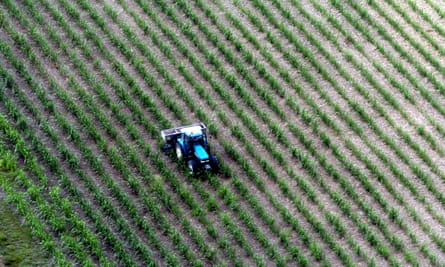Qantas is banking on converting byproducts from north Queensland sugar cane into sustainable aviation fuel, as the air industry comes under increasing pressure to minimise its emissions.
On Thursday, Qantas announced that it and plane manufacturer Airbus will jointly invest $2m in a biofuel production facility that it hopes can produce up to 100m litres of sustainable aviation fuel (SAF) a year when it opens in 2026. The Queensland government has also pledged $760,000 as part of an initial capital raising of $6m for the project.
The biofuel production facility is being developed by Jet Zero Australia in partnership with LanzaJet, a US company that has already produced SAF from carbon monoxide waste from a steel plant in China. This has been used in a blended form on commercial flights from the US.
LanzaJet’s process involves turning waste products into ethanol, which it then converts into the compound used for SAF.
Commercial aircraft are already using SAF – Airbus says all of its aircraft are capable of flying with an SAF blend of up to 50%. But experts believe ramping up production to the levels the aviation industry relies on is decades away, if possible at all.
Aviation accounts for slightly more than 2% of global CO2 emissions.
Qantas already uses a modest amount of SAF – 10m litres in 2023 – which it buys from overseas. It has committed to use 10% SAF in its overall fuel mix by 2030. The airline is expected to have to rely on offsets to achieve its commitment of net zero emissions by 2050.
In Australia, Jet Zero is focusing on agricultural byproducts from the sugar cane industry in north Queensland, with plans to build its facility in the region and rely on nearby port access.
Initially Jet Zero Australia will also use wheat starch byproducts from New South Wales, however sugar cane has the greatest potential, according to managing director Ed Mason.
Mason says that while SAF sources being developed in other countries rely on converting cooking oils, palm oil and animal fats, Jet Zero Australia would focus on agricultural byproducts.
“In my opinion [oils and fats are] just not as clean, and you’re not able to look through the lifecycle benefits as easily,” he said. “And from a social perspective people are much happier flying on biomass than on animal fat.”

Mason acknowledges that sustainable aviation fuel production is still in its infancy.
“We are pioneering this … we are taking risks with technology that’s unproven, but we’ve partnered with the most advanced technology already being used,” he said.
“We’re not dependent on new sources coming to market, and we’ve got commitments from the airline that they’re going to buy the fuel.”
Mason said Jet Zero Australia was “aggressively moving through feasibility studies” and, pending final investment, hopes to begin construction on the plant next year, with a view to it being operational by 2026. It would be Australia’s first sustainable aviation fuels plant.
after newsletter promotion
Jimmy Samartzis, LanzaJet’s chief executive, said that tests the company had done with agricultural byproducts in Canada saw a “significant reduction” in contrails, or vapour trails, which form when water vapour and soot particles form into ice crystals.
Research has suggested contrails have an even greater impact on global heating than carbon emissions from jet engines.
“This is a first but significant step towards turning agricultural and sugar cane byproducts into aviation fuel to power flights around Australia,” said Andrew Parker, Qantas’s chief sustainability officer.
Susanne Becken, a professor of sustainable tourism at Griffith University, said it was promising to see the investment in SAF, but noted it was not the only way to decarbonise aviation.
Green hydrogen and electrification technology are also being explored by the industry, though are also in early development.
Becken said that while using sugar cane byproduct was still an improvement, it was “not a silver bullet” because of the emissions resulting from growing the feedstock.
While noting the Jet Zero Australia project only relied on byproducts, Becken said it was important that feedstocks for the biofuels didn’t take away land from food production.
Becken said the world will never be able to produce enough SAF to meet aviation’s current fuel demand because the competition over land and resources is too big.
She said ultimately the world’s reliance on aviation would have to shrink to levels which alternate forms of energy could supply, whether they be SAF or electricity.
In January, Queensland researchers said they had made a breakthrough that allows them to quickly convert sugar cane into a renewable chemical that could be used for sustainable aviation fuel.
Stay connected with us on social media platform for instant update click here to join our Twitter, & Facebook
We are now on Telegram. Click here to join our channel (@TechiUpdate) and stay updated with the latest Technology headlines.
For all the latest Business News Click Here
